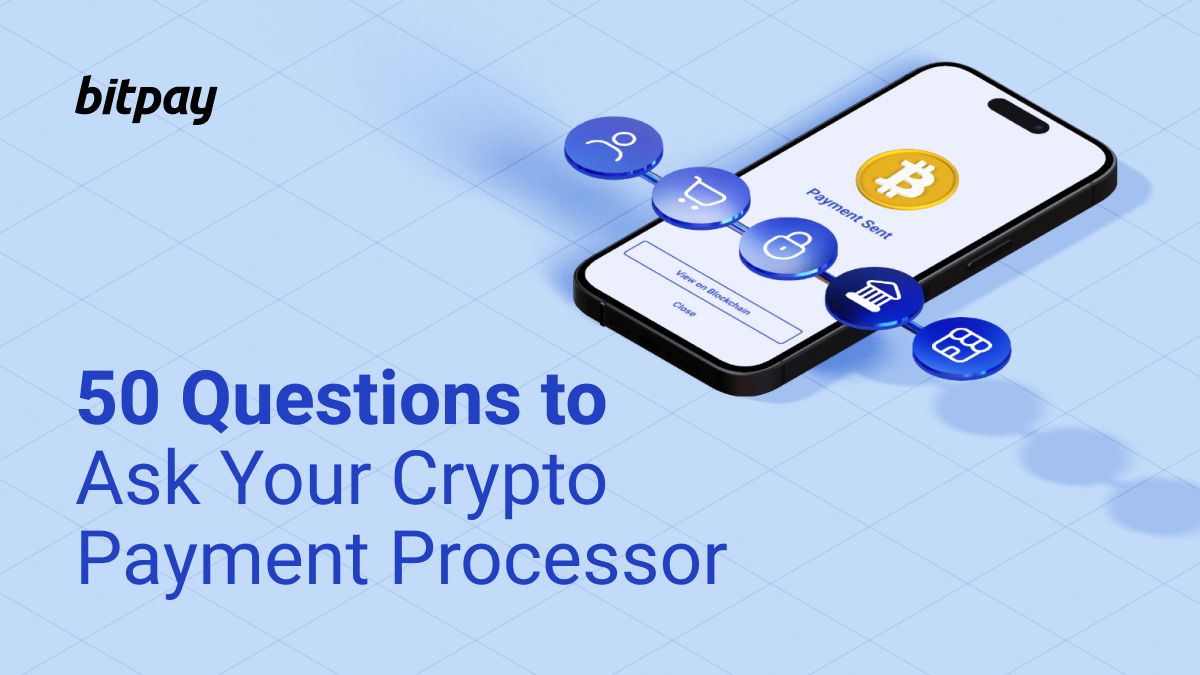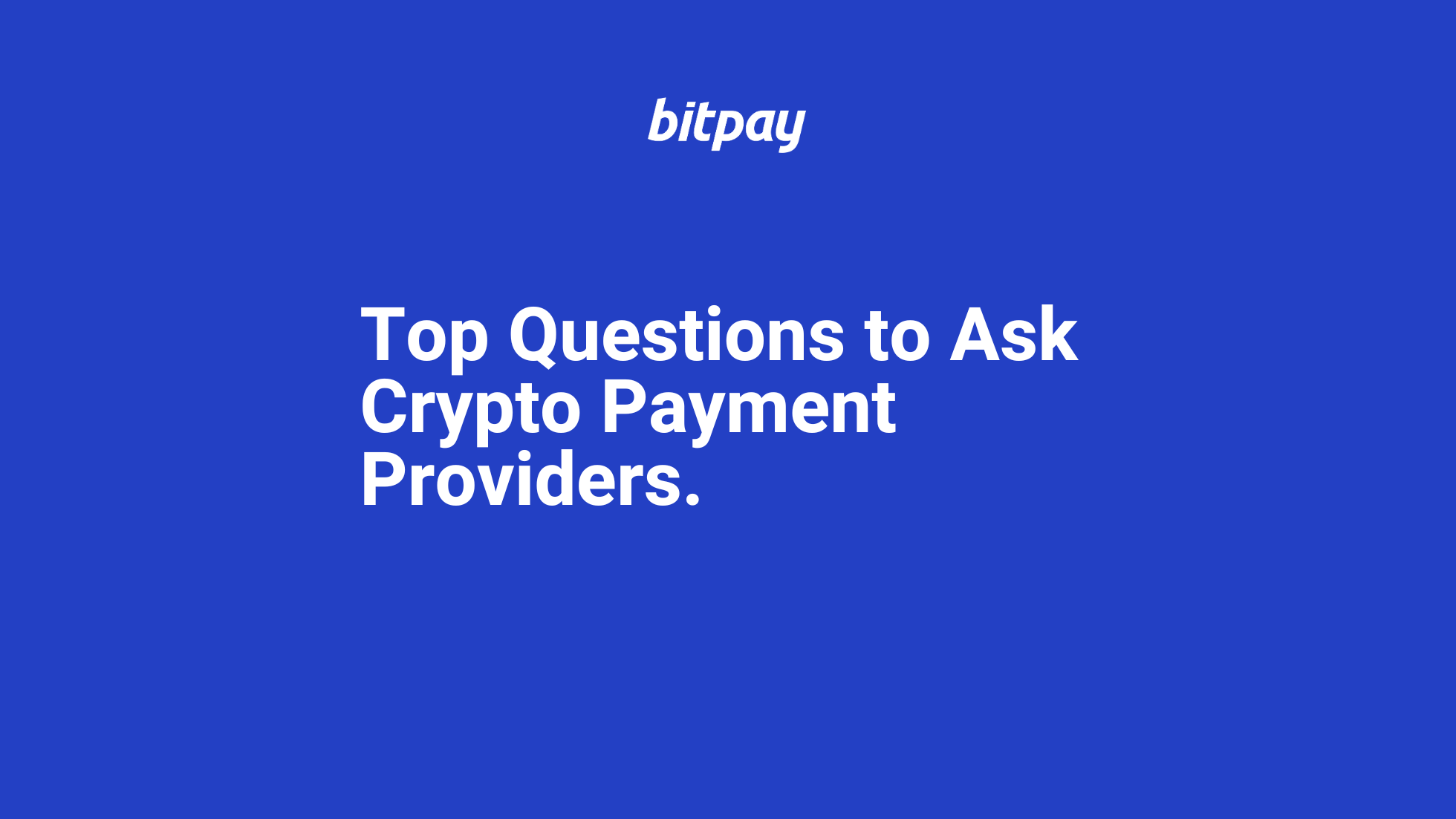Partnering with a payments processor company is often the easiest and most effective way to accept crypto payments for your business. However, not all crypto processing companies are the same.
A well-qualified partner will not only process crypto payments quickly and accurately, but also ensure your company is keeping pace with the ever-changing world of crypto, allowing you to attract new customers and remain compliant with local regulations.
Don’t risk partnering with the wrong crypto payments provider. Arm yourself with the right questions to ask when vetting potential partners. Read the overview here or download our expanded guide of questions to help spot a reliable and trustworthy crypto partner.
Free Workbook to Help Choose Your Payment Provider

Ask about the company’s origins, product focus and customer references
First, start with the basics to gather background information on the partner. How long has the company been in the crypto industry? Where is it based? Is crypto payments its core focus or is it a small piece of the company’s overall business.
“When you’re working with a company whose primary function is crypto payments, you’re going to get their full attention. Whereas you may not if it were just a side business,” - BitPay CEO, Stephen Pair.
And finally, similar to any other vetting process, ask for references. Look for references from companies similar to your own or at the very least look for good reputable companies on the customer list.
Ask about depth of products supported
With over 10,000 different cryptocurrencies and hundreds of different wallet providers, it can be difficult to decipher which to support as a merchant with little familiarity of the crypto landscape. Ask your potential partner which cryptocurrencies it can process, the wallets supported and which fiat currencies your company can receive as settlement.
BitPay CEO, Stephen Pair, highlights the importance of choosing a partner capable of perfecting the payment process: “You want the payment processor to test different coins, wallets and apps to make sure the consumer has the best possible experience.”
Ask about compliance and reporting practices
Merchants that accept crypto payments shouldn’t need to be crypto experts, but they should ask the important questions to ensure they maintain compliance and adhere to local regulations. Asking questions about a partner’s compliance track-record is paramount. Does the company possess all the required money transmitter licenses (MTL)? How about a New York BitLicense? How many states are they licensed in? What are the company’s KYC (Know Your Customer) practices? Does the company have a full-time compliance team?
“Not all companies are as compliance-forward and reputable as others, some are just good salespeople. Looking for those key compliance elements is a very good indicator of a payments processor’s longevity and likelihood of success with a merchant.” - BitPay Counsel & Chief Compliance Officer, Allison Raley.
Ask about settlement details and requirements
The core function of crypto payment processors is to make accepting crypto simple for merchants. Key questions relating to crypto custody requirements and payment settlement options can give a glimpse into a prospective partner's processes and what to expect in the future. Does your company need to maintain a crypto wallet? Do merchants take custody of the crypto? How does the partner approach crypto volatility? What settlement types does the partner offer? How fast are crypto payments settled into fiat? Another key piece of information to gather is the partner’s financial health as a business.
“Make sure the payment processor is financially stable and has sufficient cash reserves on their balance sheet to make timely settlements." - BitPay CFO, Jagruti Solanki
Ask about technical integration
Once you’ve decided you want to accept crypto payments, it's time to get technical and start evaluating integration options. Different partners will have various implementation methods and the exact right fit will depend on your business’s circumstances. If you run an online-only business, ask prospective partners about plugins, integration solutions and code libraries to match your website systems. For businesses with in-person and online presence, ask about available omnichannel solutions so you can accept crypto payments everywhere that your customers are shopping. Most importantly when considering integrations, ask the partner if their team has the experience and bandwidth to assist you from a technical and operational perspective so you can be up and running in a timely manner.
“Look for partners that offer a multitude of integration methods, not necessarily a one-size-fits-all solution where you have to fit into their model,” - Shaan Katyal, Head of Implementations at BitPay.
Ask about user experience
Crypto payments can be intimidating to first time users, so having a smooth user experience is critical to a merchant’s success. To determine how a payments processor may assist in providing seamless UX, ask about exchange range markups, what the partner does to reduce payment exceptions, who is responsible in the case of payment exceptions, and how refunds are handled. Usability goes beyond ease of use. A crypto partner should make it as easy to pay with crypto as credit cards and traditional payment gateways.
“It’s not just about having a great user experience, it's also about having an experience that customers are familiar with.” - BitPay CEO, Stephen Pair
Ask about onboarding and ongoing support
Finally, ask your prospective partners how their teams are built to onboard and continually support you as a merchant. Do they help with onboarding? Do they provide you with technical troubleshooting and assistance? Will you have a dedicated account manager? Does the partner offer marketing support and collaboration?
“Since the crypto landscape is constantly evolving, merchants should look for a partner that will help them grow their crypto customer base and awareness through collaborative marketing and education initiatives.” - Merrick Theobald, VP of Marketing at BitPay.
This article is a quick summary of our suggested list of questions every merchant should ask while evaluating a potential crypto payment processing partner. Download the FREE workbook of 50 questions to help choose the right partner.
Review the Full List of Questions You Need to Ask [Free Workbook]

